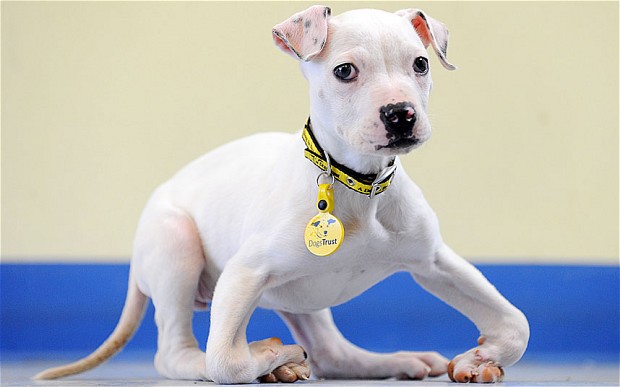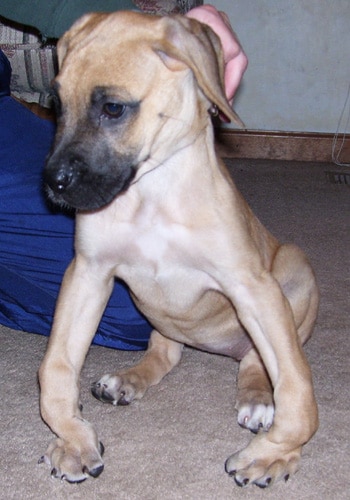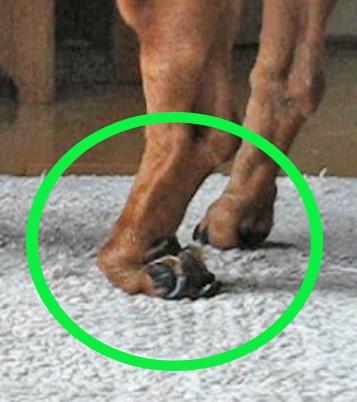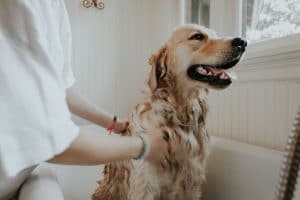In this blog, we look at dog front paw knuckling under, what causes the dogs to do this and how to treat and prevent it from happening again. The term dog knuckling refers to when a dog walks or rests on the top of its feet instead of its paws. This can happen to one limb or a couple but rarely all 4.
Paw knuckling in dogs is when their paw folds under, causing the top of their paw to touch the ground while walking. This is typically a sign of a neurological problem, and it can be caused by various underlying issues such as nerve damage, spinal cord injury, or other neurological disorders.
Knuckling under is an uncomfortable position to be in and restricts dogs from doing all manner of things easily, the most obvious being running and walking. It’s important to consult with a veterinarian if you notice paw knuckling in your dog, as it can indicate a serious condition that requires medical attention.
If left untreated, dog-knuckling back paws or dog-knuckling front paws can lead to permanent damage and affect their gait forever. If you see your dog has started to knuckle, it’s time to find a possible cause and organise a trip to the vents.
Treatment for paw knuckling will depend on the underlying cause. Your veterinarian may recommend various treatments, such as medications to reduce inflammation, physical therapy exercises, or surgery in severe cases. It’s important to follow their recommendations closely to ensure the best outcome for your furry friend.
Additionally, there are things you can do at home, such as providing a safe and comfortable environment for your dog to move around in, avoiding slippery surfaces, and using traction socks or boots. Physical therapy exercises can also be helpful in improving your dog’s coordination and strengthening its muscles.

What causes a dog’s paws to knuckle under?
Causes for knuckling in dogs vary wildly; there isn’t just one cause for it to happen. When looking to confirm if your dog is actually ‘knuckling under’ or just coincidentally placed it like that for no reason, then hold your dog’s paws and place it in a knuckling position on the floor
If your dog corrects it then they aren’t knuckling; if your dog doesn’t correct, then they are knuckling under. It will be much more obvious if they do it with more than one paw.
Disclaimer: JugDog.co.uk are not a qualified source of canine medical help, and this guide is to be informative but not advice. If you suspect your dog needs medical attention, consult a vet immediately.
Here are some common reasons why your dog may be knuckling under their paws:
1. Sore Paws
One of the biggest causes of knuckling paws, which you should look for first, is sore paws. Sore paws themselves could have more than one symptom, but if you check them out, it should become obvious if this is the root cause of the knuckling.
Has your dog cut or grazed their paws, making it painful to walk on them? Be sure to clean the paw out, seek disinfectant for the wound, and allow for healing over time – try not to make them go for walks unless necessary during this time.
Other causes could be broken or infected nails, which can arise from cutting them too close to the quick (we have an article of interest for the best dog nail clippers) or from their nails being split from wearing or a sudden impact.
Look at the paw and see for yourself; if it hasn’t resolved or healed well in 24 hours, then consult a vet.
2. Carpal Flexural Deformity
Carpal flexural deformity means that the dog’s “wrists” haven’t developed well enough to bare the weight of the dog and make the dog knuckle under to allow them to bare the weight.
The carpal flexural deformity usually occurs in young puppies undergoing a growth spurt, and a plausible theory is that some parts of the dog are growing and developing faster than others. A splint can help get the development back on track and usually should rectify the problem permanently. It’s most common in larger breeds such as Great Danes, German Shepherds and Dobermans.
3. Arthritis/Degenerative Myelopathy
Older dogs who are experiencing arthritis can struggle to move because of their joints seizing up, and this can lead to dogs knuckling under their paws as a means to make it a little bit more comfortable; this is a well-known progressive disease which will only worsen with time unfortunately, knuckling under is likely not to be the first symptom of arthritis.
If you have an older dog whose paw is knuckling under, I’d consider these two reasons first, especially if they are of a larger breed, such as a German Shepherd.

4. Carpal Flexural Deformity
The carpal flexural deformity is another condition which occurs during the dog’s early days. This is often a result of a poor diet (see our range of high-fibre and wet dog food) and an excess protein intake.
As we’ve mentioned previously, we aren’t qualified veterinarians, so if you have a young dog under 5 months of age knuckling its paws, then take them to the vet, and they will be able to see if the cause can be treated with an improved diet. If treated properly and perhaps with a splint, carpal flexural deformity symptoms (knuckling) should disappear after a couple of weeks.
5. Fibrocartilaginous Embolism
Fibrocartilaginous embolism is a nasty condition brought on by sudden trauma during exercise; the trauma breaks a part of the spine, which cuts off blood supply to areas of the body such as limbs and so on. This is a very serious condition which is difficult to spot initially – you may notice a yelp during exercise but may not see your dog in any more pain after that. Knuckling is one of many symptoms of fibrocartilaginous embolism, so you’ll probably know to take your dog to the vet before any knuckling happens.
Can dogs recover from knuckling?
Generally, paw knuckling is treatable in dogs, but some may not be completely cured. However, your dog can still live a happy and healthy life with the right care and management. Work closely with your veterinarian to ensure your dog receives the best care for their condition.
1. How do you treat a dog’s knuckling paw?
The first step in treating paw knuckling is to identify the underlying cause. It could be due to an injury or a neurological condition, and the treatment will vary accordingly.
Here are some common treatments to help your furry friend recover from paw knuckling.
I. Physical therapy
Physical therapy can be a great way to help your dog recover from paw knuckling. Your vet may recommend exercises or stretches to help your dog regain strength and coordination in their legs.
II. Medications
Sometimes, your vet may prescribe medications to help manage the underlying condition causing the paw knuckling. These could include anti-inflammatories, pain relievers, or even steroids.
III. Bracing or splinting
A brace or splint may be necessary in more severe cases of paw knuckling. These devices can help keep the leg in the correct position and promote healing.
IV. Surgery
If the paw knuckling is caused by an injury or a neurological condition, surgery may be necessary. This can help correct the issue and allow your dog to regain full use of their legs.
It is important to note that the success of these treatments depends on the severity of the condition and how early it is detected. If you notice your dog is knuckling, it is best to consult with your vet as soon as possible.
2. How to prevent it?
Prevention is always better than cure, and there are some things you can do to help prevent paw knuckling in your dog.
I. Exercise and physical activity
Regular exercise and physical activity can help keep your dog’s muscles and joints strong and healthy. This can help prevent injuries and other conditions that may lead to paw knuckling.
II. Proper nutrition
A balanced and nutritious diet is important for maintaining overall health, including your dog’s muscles and joints. Make sure to feed your furry friend a diet rich in essential nutrients.
III. Keep your dog at a healthy weight
Being overweight can stress your dog’s joints and muscles, increasing the risk of injury and other conditions. Make sure to keep your dog at a healthy weight through a proper diet and regular exercise.
IV. Regular check-ups with your vet
Regular check-ups with your vet can help detect any underlying conditions or injuries that may lead to paw knuckling. Early detection and treatment can help prevent the condition from worsening.
Frequently Asked Questions (FAQs)
1. Is knuckling in dogs serious?
Knuckling in dogs can be a sign of a serious underlying condition and should be addressed promptly. It’s important to seek veterinary attention if you notice your dog’s paws knuckling under, especially if it persists or is accompanied by other symptoms.
2. Can a stroke cause knuckling in dogs?
A stroke can cause knuckling in dogs. When a dog suffers from a stroke, it can affect its motor skills and coordination, causing them to lose control of their limbs. This loss of control can lead to paw knuckling, when the dog’s paw curls under, and they walk on the top of their foot.
If you suspect your dog may have suffered a stroke or is experiencing paw knuckling, it’s important to seek veterinary care immediately.





Have read your article fully is there anything that can ve done for an older dog with this condition I on front paw.
My puppy is knuckling
After electro-acupuncture was performed on my dogs front pads he had difficulty walking. As if his feet were too sore. This lasted a few days but now he is knuckling on both front feet. Seeing his usual vet tomorrow and not the vet who did acupuncture.
My great dane is knuckling front paw does not appear in pain has had TPLO when 2 years old now 7 this was done on hind leg fit and healthy otherwise
I’m my 14 year old chihuahua is knuckling under on front right foot as he walks . He does have arthritis and kidney disease . Is there anything I can do to help him
My friend has a Chihuahua which is 11 years old his front paw keeps knuckling when he just sits there any advice plz
It’s difficult to find knowledgeable individuals for this topic, nevertheless, you could be seen as do you know what you are talking about! Thanks